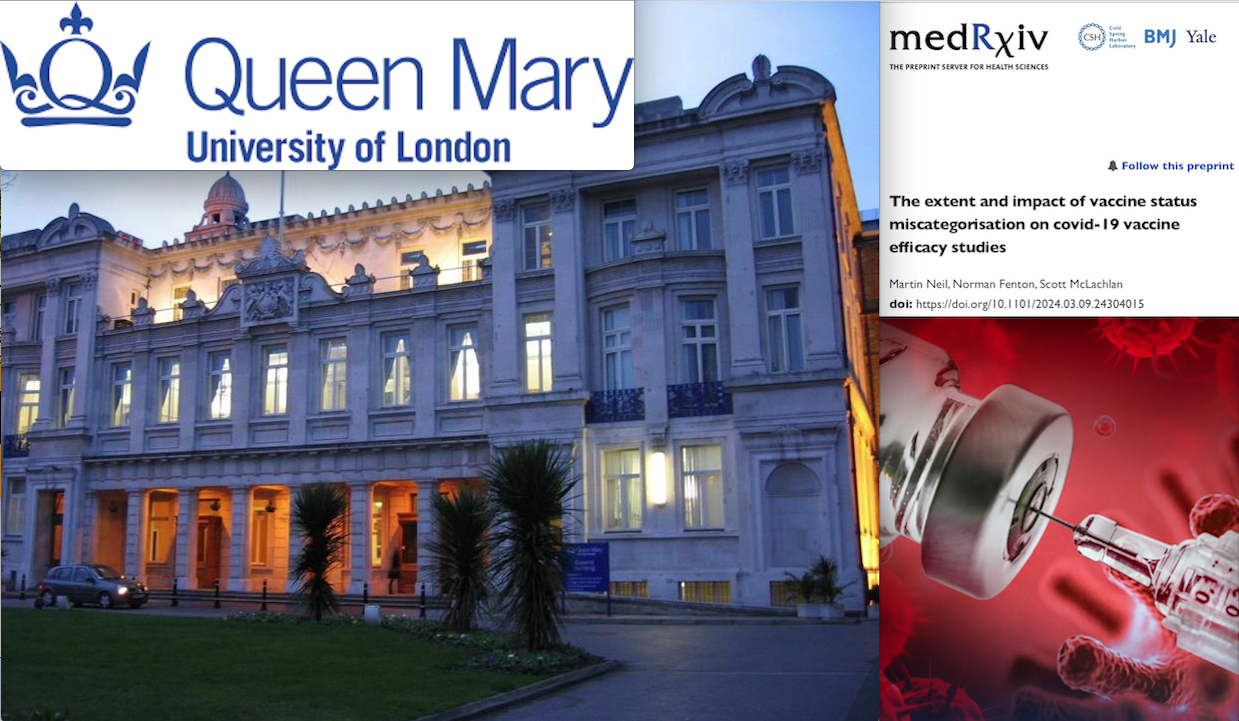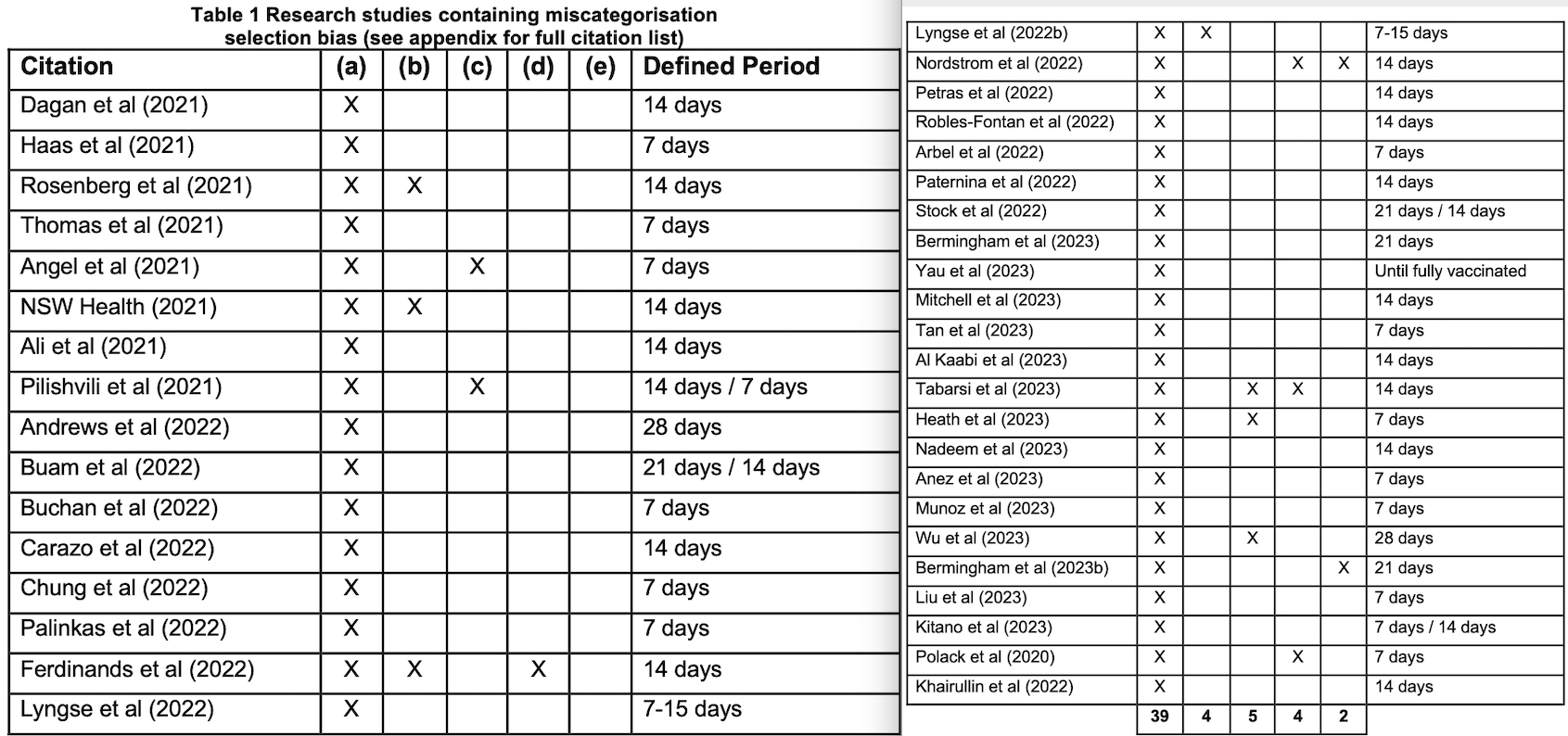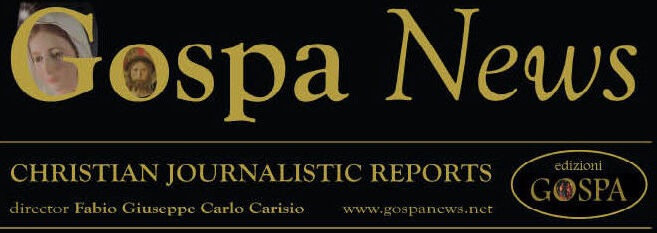“Covid Vaccines Efficacy just an Illusion”. 39 Studies are Fake. Explosive Research by 3 Scientists of Major London Universities

In the cover image the School of Electronic Engineering and Computer Science at Queen Mary, University of London, where study has been conducted
by Fabio Giuseppe Carlo Carisio
«It is recognised that many studies reporting high efficacy for Covid-19 vaccines suffer from various selection biases. Systematic review identified thirty-nine studies that suffered from one particular and serious form of bias called miscategorisation bias, whereby study participants who have been vaccinated are categorised as unvaccinated up to and until some arbitrarily defined time after vaccination occurred».
In three lines, three haloed scientists from the most prestigious universities in London destroy the mainstream lie about the effectiveness of Covid vaccines which, however, opposing research considers increasingly dangerous even in the long term because they are associated with anomalous forms of turbo-cancer.
To understand the language we must first explain what BIAS is: «In physics and electronic technology, the value of a variable introduced specifically or always present; in particular, systematic error” explains the Treccani encyclopedia.
Translated into simpler words, it is the margin of error of a statistical research which must be weighted and calculated in relation to the empirical methods of analysis. Here, given the seriousness of the “bias” detected by the three researchers, we took the liberty of using the term “fake” in reference to the studies they examined.
«Simulation demonstrates that this miscategorisation bias artificially boosts vaccine efficacy and infection rates even when a vaccine has zero or negative efficacy. Furthermore, simulation demonstrates that repeated boosters, given every few months, are needed to maintain this misleading impression of efficacy. Given this, any claims of Covid-19 vaccine efficacy based on these studies are likely to be a statistical illusion».
Higher Mortality Found Among Vaccinated Patients Hospitalized for COVID-19: New Study
And what we read in the Abstract of the study entitled “The extent and impact of vaccine status miscategorisation on covid-19 vaccine efficacy studies – 19″.
The research was published in preprint on MedRxiv on March 9, 2024 and although it has not yet received a “peer-view peer review” it can already be considered extremely reliable both for the number of studies examined and for the authoritativeness of the researchers:
Martin Neil, School of Electronic Engineering and Computer Science Queen Mary, University of London
Norman Fenton, School of Electronic Engineering and Computer Science Queen Mary, University of London
Scott McLachlan, School of Nursing, Midwifery and Palliative Care Kings College London
The topic is so technical that we do not have much to add compared to the exhaustive clarifications of statistical experts, therefore we summarize methods and conclusions, giving preponderance to the research citations. We will simply include links to other studies with related topics.
Methods of Research
«A search was conducted of PubMed and Scopus seeking literature presenting either a retrospective health records or prospective clinical trial of one or more Covid-19 vaccines with efficacy or safety as an endpoint. The search term used was: [covid] and [vaccine] and [efficacy] and [safety]»
we can read in the study.
«The initial search returned 2,209 results. 476 Duplicates were removed, as well as 1,562 that while discussing or mentioning vaccines for Covid-19 did not present a study of vaccine efficacy or safety and 134 single-page works that were a mix of protocol disclosures and abstracts of results. Of the 37 remaining, 35 provided sufficient detail of the inclusion and exclusion criteria for inclusion in this study. A further 4 papers were identified through citation mining of included papers».
«Each paper was evaluated for a range of aspects that included the manufacturer and type of vaccine, the control cohort comparator (placebo or unvaccinated), the primary outcomes (prevention of infection, hospitalisation, ICU admission or death), the author’s potential conflicts of interest (declared and undeclared) and whether they included one or more types of miscategorisation selection bias. This work reports on the last of these factors».
Types of miscategorisation selection bias
«Our review identified the following five types of the miscategorisation selection bias:
- (a) Miscategorisation: During the arbitrarily defined period the vaccinated are categorised as unvaccinated, twice vaccinated categorised as single vaccinated, or boosted categorised as twice vaccinated (e.g.: Buchan et al, 2022; Stock et al, 2022).
- (b) Unverified:Participants whose vaccination status is unknown or unverified are categorised as unvaccinated (e.g.: Rosenberg et al, 2021; Lyngse et al, 2022b).

- (c) Uncontrolled: Participants are allowed to self-administer or self-report their vaccination or infection status, became unblinded or sought vaccination outside the study (e.g.: Angel et al, 2021; Wu et al, 2023).
- (d) Excluded: Participants who are vaccinated but who become infected or died during the arbitrarily defined period are neither categorised as unvaccinated or vaccinated but are instead simply removed from analysis (e.g.: Tabarsi et al, 2023; Heath et al, 2023);
- (e) Undefined: The authors of the study fail to provide definitions for either or both vaccinated and unvaccinated cohorts (e.g.: Bermingham et al, 2023b; Nordstrom et al, 2022).
Table 1 lists the incidence and frequency of use for each type of miscategorisation selection bias in Covid-19 vaccine effectiveness research studies. Use of the arbitrary miscategorisation type was ubiquitous, identified in 100% of the reviewed studies. Further, nearly one-third (31%) also used one or more of the other types of bias».
Conclusions: “Covid-19 vaccine efficacy based on these studies are likely to be a statistical illusion”
«Our reviews reveals that a serious form of selection bias, miscategorisation, is pervasive throughout the many research studies that aim to measure Covid-19 vaccine efficacy. The effect of this bias is to artificially inflate vaccine efficacy and present the misleading impression that these vaccines are effective and that the non-vaccinated suffer from higher Covid-19 infection rates compared to the vaccinated».
«We presented a simulation model to demonstrate the effects of this selection bias and show it artificially boosts vaccine efficacy in all cases, and with the application of repeated ‘booster’ vaccinations, the efficacy of repeated Covid-19 vaccines could be maintained at artificial levels in perpetuity should boosting be continued indefinitely. This effect occurs with a both a zero-efficacy (placebo) vaccine and a negative-efficacy vaccine that increases, rather than reduces, infection rates in those vaccinated».
This is a similar conclusion reached by a study by Harvard doctors in relation to the more resistant and infectious variants of SARS-Cov-2 as predicted by the biologists Franco Trinca and Luc Montagnier, both of whom mysteriously died while conducting their media battle on dangers of mRNA or mDNA vaccines financed by Bill Gates’ global immunization project.
«This miscategorisation is guaranteed to lead to initially very high efficacy claims (usually above 90%) during peak vaccine rollout even if the vaccine were a placebo or worse. Efficacy then falls toward zero a few weeks later. This pattern of high initial efficacy, tapering off after 3 months is also consistently observed in real-world studies, and is often used as justification for additional, booster vaccinations to maintain efficacy. The corresponding Covid-19 infection rate is also likewise artificially elevated in the unvaccinated cohort compared to the vaccinated cohort. These issues apply to other measures of vaccination effectiveness related to mortality and morbidity. Thus, we conclude that any claims of Covid-19 vaccine efficacy based on these studies are likely to be a statistical illusion».
But in Italy as in the rest of the West they continue to be promoted as a panacea despite the enormous conflicts of interest with the Big Pharma of the Minister of Health Orazio Schillaci, who also ended up in the sights of the famous magazine SCIENCE for having falsified a study on cancer…
Subscribe to the Gospa News Newsletter to read the news as soon as it is published
Fabio Giuseppe Carlo Carisio
© COPYRIGHT GOSPA NEWS
prohibition of reproduction without authorization
follow Fabio Carisio Gospa News director on Twitter
follow Gospa News on Telegram
MAIN SOURCES
GOSPA NEWS – WUHAN-GATES DOSSIER
SCIENCE: Possible Misconduct found in Cancer Papers from Italian Minister of Health



